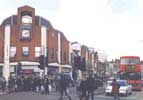|
|
|
| Home |  |
|
|
|
|
|
|
The
Road Ahead At our AGM
in October 1996, we made an effort to redefine the tasks for
the year ahead. It was agreed that our overall aim should be to
get more people on cycles in Ealing, and to raise public awareness
of cycling as an environmentally friendly and healthy means of transport. Particularly,
we wanted to see:
The existing
committee were enthusiastically re-elected, they are: Simon Batterbury:
Council liason, Martin Gorst: Treasurer, Angela Devas: Parks Liason.
Cycle Challenge
ends... The Cycle Challenge
project at Thames Valley University finished in April 1997. The
results of a survey of 324 TVU students and staff revealed that
around 8% of those surveyed always cycle to campus (higher than
the Borough average of 3%), against 33% who always drive in. Public
transport is popular. Average travel distances were under five miles,
showing a potential for more cycling. Its other achievements were
the installation of cycle racks for 145 bikes, a win-a-bike competition
with 15 winners, and a small cycle mileage allowance (5p/mile!).
On 30th January,
TVU held an evening of debate on transport issues, entitled 'People,
Pedalling and Parking'. Sir George Young made a brief appearance
and complemented the project on raising the profile of cycling.
Error! Bookmark not defined. for project report. ...Repair
Workshop Starts Due to Thames
Valley University's kind offer to host the long awaited LCC bike
repair workshops, these are now going ahead. Bring your bike along
and we will lead you through basic repairs and give advice. Workshops
take place on the first Wednesday of the month. They are held behind
the main TVU building on Bond Street. Access is from Mattock Lane
- through the barrier between Yates's Wine Lodge and the old cinema
facade. There is a fee of £1 for LCC members, £3 for
non-members. The next will
be on Wednesday 4 June 1997, from 19:00 to 20:30. Future workshops
will be on Wednesday 2 July and Wednesday 6 August 1997. Council
Liason Cycle works There has not
been much action on new schemes recently. The Ironbridge work is
still not complete, but some advanced stop lines are beginning to
appear on the Uxbridge Road such as the one in Acton. Ealing Common
is to get a proper bike junction onto the Uxbridge Rd. Local
Transport Day We were out
in force at Local Transport Day on March 1 1997, when the Council
annouced the publication of the Borough Transport Strategy (very
pro-bike) and Local Area Plans for several sub-areas of the Borough.
The Area Plans are an effort to devolve planning to a local level
after public consultation. The consultations were a little patchy,
but pro-bike proposals and traffic calming feature in most of the
plans completed so far (Northolt, Greenford, Hanwell/W Ealing, Perivale).
Plans are available from M Donnellan, Perceval House, 14-16 Uxbridge
Rd W5 2HL. Michael Peel
spoke on the day, and Simon and Tom prepared a display. It highlighted
the continued problem of nasty speed humps, which the Council seem
unwilling to re-design, even when they block designated cycle routes.
The
Future While national
targets are calling for a doubling of cycle journeys in the next
five years, Ealing has lowered its target for increasing cycling
in the borough. It should reverse this decision immediately. There
is still much more it could do to encourage cycling and make it
safer. Changing the advisory cycle lanes to designated lanes should
be its first step. Our constant
efforts to upgrade the cycle network and make sure traffic calming
is bike-friendly now need proper implementation if they are to mean
anything. Car-free or
care free ? Error! Bookmark not defined.reveals how she copes without
a car A friend of
mine developed epilepsy after the birth of her child. She was in
despair because she could no longer drive. I've brought up my daughter,
now aged three, without a car throughout, so I thought I'd explain
how I manage. When I moved
from Brighton to London, I chose a house which is near to all the
things I need, particularly a good local tube station, but also
two bus routes. I can also walk to work, which saves on time and
money. Everything is organized on a local basis; childminder, doctor,
hairdresser and so on. When I 'm buying something bulky, the first
question I always ask is 'Do you deliver?' which most places do
especially if they think it's going to make a sale. My greatest
bid for freedom was getting a new bike and a childseat. I agonised
over this because I am so terrified of road dangers, and in the
end I decided I'd get one, but we'd only ride on pavements, which
is what we do. On my own, I go in the road: with Catherine behind
me we both go on the pavement, or dedicated, car-free cycle lanes.
We both wear cycle helmets. This opened up a whole new world to
us. On Christmas day we cycled to Richmond and back on an empty
tow path, in beautiful winter sunshine. The trip was only marred
by me forgetting that while I was getting warmer and warmer, my
poor little scrap at the back was gently freezing. On Boxing Day
we cycled back from visiting friends to see a beautiful nearly new
moon rising over the frosty allotments. One of the biggest drawbacks to not having a car is other people's attitudes. Fifty years ago, not having a car was normal. This is still the case in Holland, Germany and Scandinavia, except that people have cars, but don't use them for local journeys. As a result public transport is much better, cycle tracks abundant and safe, and far less pollution is generated. |